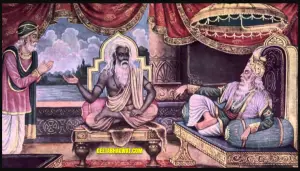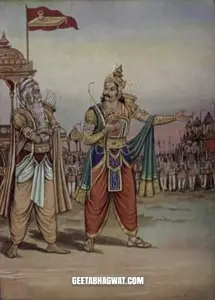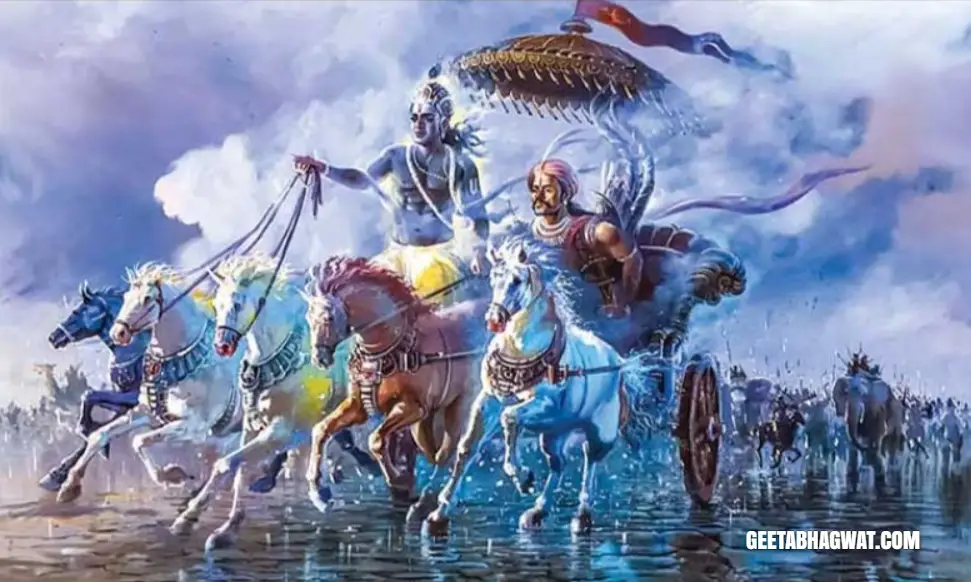In this blog post about Verses 1-10 of Bhagwad Geeta Chapter 1, we embark on a spiritual journey through the timeless wisdom of the Srimad Bhagwad Geeta, one of the world’s most revered philosophical texts.
We will delve into the profound depths of the first chapter, focusing specifically on the initial ten verses, which set the stage for the epic dialogue between Prince Arjuna and Lord Krishna.
These verses introduce us to the battlefield of Kurukshetra, where the great Mahabharata war is about to commence. This exploration will not merely be a literal interpretation of the verses, but a quest to unearth the philosophical and spiritual insights embedded within them.
Whether you’re a seasoned scholar of the Geeta, a spiritual seeker, or a curious reader, this blog post aims to offer a fresh perspective on these ancient verses, illuminating their relevance in our contemporary lives. So, let’s begin this enlightening journey together, delving into the profound wisdom of the Bhagwad Geeta.
=====================================================

#Bhagwad Geeta Chapter 1, Verse 1:
“Dhritarashtra Uvacha:
Dharmakshetre Kurukshetre Samaveta Yuyutsavaha;
Mamakah Pandavaschaiva Kimakurvata Sanjaya.”
(अध्याय 1, श्लोक 1)
धृतराष्ट्र उवाच :
धर्मक्षेत्रे कुरुक्षेत्रे समवेता युयुत्सवः।
मामकाः पाण्डवाश्चैव किमकुर्वत सञ्जय।।1.1।।
In English, this translates to:
“Dhritarashtra said: On the holy land of Kurukshetra, where everyone had assembled for battle, what did my sons and the sons of Pandu do, O Sanjaya?”
In Hindi, this translates to:
धृतराष्ट्र ने कहा:
धर्मक्षेत्र कुरुक्षेत्र में युद्ध के लिए इकट्ठे हुए मेरे और पांडु के पुत्रों ने क्या किया, हे संजय?
This verse sets the stage for the epic conversation between Arjuna and Krishna, which forms the core of the Bhagavad Gita. The question is asked by Dhritarashtra, the blind king, to his charioteer Sanjaya, who has been granted divine vision to witness and narrate the events of the battlefield.
=====================================================
#Bhagwad Geeta Chapter 1,Verse 2:
“Sanjaya Uvacha:
Drishthwa tu Pandavanikam Vyudham Duryodhanas Tada;
Acharyam Upasangamya Raja Vachanam Abravit.”
(अध्याय 1, श्लोक 2)
संजय उवाच:
दृष्ट्वा तु पाण्डवानीकं व्यूढं दुर्योधनस्तदा।
आचार्यमुपसंगम्य राजा वचनमब्रवीत्।।1.2।।
In English, this translates to:
“Sanjaya said: O King, after looking over the army arranged in military formation by the sons of Pandu, King Duryodhana went to his teacher and spoke the following words.”
In Hindi, this translates to:
संजय ने कहा: हे राजन्! उस समय दुर्योधन ने पाण्डवों की व्यूहरचना को देखकर अचार्य के पास जाकर यह वचन कहा।
This verse marks the beginning of the narrative by Sanjaya, who describes the events unfolding on the battlefield to Dhritarashtra.
=====================================================

#Bhagwad Geeta Chapter 1,Verse 3:
“Pashyaitam Pandu-Putraanam Acharya Mahateem Chamoom;
Vyudhaam Drupada-Putrena Tava Shishyena Dheemataa.”
(अध्याय 1, श्लोक 3)
पश्यैतां पाण्डुपुत्राणामाचार्य महतीं चमूम्।
व्यूढां द्रुपदपुत्रेण तव शिष्येण धीमता।।1.3।।
In English, this translates to:
“O my great teacher, (please) behold the great looking army of the Pandu sons, expertly arranged by your intelligent disciple, the son of Drupada.”
In Hindi, this translates to:
हे आचार्य! आप द्रुपद के पुत्र और आपके बुद्धिमान शिष्य द्वारा व्यूहरचना की हुई पाण्डुपुत्रों की उस महान सेना को देखिए।
This verse is spoken by Duryodhana as he addresses his martial teacher, Dronacharya, expressing his concern about the formidable army of the Pandavas, arranged by Dhrishtadyumna, the son of Drupada and the disciple of Dronacharya.
=====================================================
#Bhagwad Geeta Chapter 1,Verse 4:
“Atra Shura Maheshvasa Bhimaarjuna-Samaa Yudhi;
Yuyudhaano Viraatashcha Drupadashcha Mahaarathah.”
(अध्याय 1, श्लोक 4):
अत्र शूरा महेष्वासा भीमार्जुनसमा युधि।
युयुधानो विराटश्च द्रुपदश्च महारथः।।1.4।।
In English, this translates to:
“Here in this army are many heroic bowmen equal in fighting to Bhima and Arjuna: there are also great fighters like Yuyudhana, Virata, and Drupada.”
In Hindi, this translates to:
इसमें (पाण्डवों की सेना में) शूरवीर और महाधनुर्धारी योद्धा हैं, जो युद्ध में भीम और अर्जुन के समान हैं। युयुधान, विराट और द्रुपद भी महारथी हैं।
In this verse, Duryodhana continues to describe the formidable army of the Pandavas to his teacher, Dronacharya, listing some of the great warriors on their side.
=====================================================
#Bhagwad Geeta Chapter 1,Verse 5:
“Drishtaketus Chekitanah Kasirajas Cha Viryavan;
Purujit Kuntibhojas Cha Shaibyas Cha Narapungavah.”
(अध्याय 1, श्लोक 5):
दृष्टकेतुश्चेकितानः काशिराजश्च वीर्यवान।
पुरुजित्कुन्तिभोजश्च शैब्यश्च नरपुङ्गवः।।1.5।।
In English, this translates to:
“There are also great, heroic, powerful fighters like Dristaketu, Chekitana, and Kasiraja; there are also Purujit, Kuntibhoja, and Shaibya—all are great warriors.”
In Hindi, this translates to:
दृष्टकेतु, चेकितान, काशिराज और वीर्यवान, पुरुजित, कुन्तिभोज और शैब्य – ये सभी महान योद्धा हैं।
In this verse, Duryodhana continues to list the names of the formidable warriors on the Pandava side, further emphasizing the strength of their army.
=====================================================
#Bhagwad Geeta Chapter 1,Verse 6:
“Yudhaamanyus Cha Vikraanta Uttamaujaas Cha Veeryavaan;
Saubhadro Draupadeyaas Cha Sarva Eva Mahaarathaah.”
(अध्याय 1, श्लोक 6):
युधामन्युश्च विक्रान्त उत्तमौजाश्च वीर्यवान।
सौभद्रो द्रौपदेयाश्च सर्वे एव महारथाः।।1.6।।
In English, this translates to:
“There are the mighty Yudhamanyu, the very brave Uttamauja, the son of Subhadra, and all the sons of Draupadi. These warriors are great chariot fighters.”
In Hindi, this translates to:
युधामन्यु और वीर्यवान उत्तमौजा, सौभद्र (अभिमन्यु) और द्रौपदी के पुत्र – ये सभी महारथी हैं।
In this verse, Duryodhana continues to describe the warriors in the Pandava army, including Abhimanyu (the son of Subhadra) and the sons of Draupadi, all of whom are skilled in chariot warfare.
=====================================================
#Bhagwad Geeta Chapter 1,Verse 7:
“Asmaakam Tu Vishaishtha Ye Taan Nibodha Dvijottama;
Naayakaa Mama Sainyasya Samjnartham Taan Braveemi Te.”
(अध्याय 1, श्लोक 7)
अस्माकं तु विशिष्टा ये तान्निबोध द्विजोत्तम।
नायका मम सैन्यस्य संज्ञार्थं तान्ब्रवीमि ते।।1.7।।
In English, this translates to:
“But for your information, O best of all the Brahmanas, let me inform you about the highly qualified captains who are leading my military force.”
In Hindi, this translates to:
हे द्विजश्रेष्ठ! अब आप हमारी सेना के विशेष योद्धाओं को जानिए, जिन्हें मैं आपको बता रहा हूँ, वे मेरी सेना के नायक हैं।
In this verse, Duryodhana shifts his focus from the Pandava army to his own forces. He begins to describe the leaders of his own army to Dronacharya.
=====================================================
#Bhagwad Geeta Chapter 1,Verse 8:
“Bhavan Bhishmas Cha Karnas Cha Kripas Cha Samitim-Jayah;
Ashvatthaamaa Vikarnas Cha Saumadattis Tathaiva Cha.”
(अध्याय 1, श्लोक 8)
भवान्भीष्मश्च कर्णश्च कृपश्च समितिंजयः।
अश्वत्थामा विकर्णश्च सौमदत्तिस्तथैव च।।1.8।।
In English, this translates to:
“There are personalities like yourself, Bhishma, Karna, Kripa, Ashvatthama, Vikarna and the son of Somadatta called Bhurisrava, who are always victorious in battle.”
In Hindi, this translates to:
आप (द्रोणाचार्य), भीष्म, कर्ण, कृपाचार्य, अश्वत्थामा, विकर्ण और सोमदत्त के पुत्र भूरिश्रवा – ये सभी युद्ध में विजयी योद्धा हैं।
In this verse, Duryodhana begins to list the names of the formidable warriors on his own side, including Bhishma, Karna, Kripacharya, Ashwatthama, Vikarna and Bhurishrava all of whom are renowned for their prowess in battle.
=====================================================
#Bhagwad Geeta Chapter 1,Verse 9:
“Anye Cha Bahavah Shooraa Madarthe Tyakta-Jeevitah;
Naanaa-Shastra-Praharanaah Sarve Yuddha-Vishaaradaah.”
(अध्याय 1, श्लोक 9)
अन्ये च बहवः शूरा मदर्थे त्यक्तजीविताः।
नानाशस्त्रप्रहरणाः सर्वे युद्धविशारदाः।।1.9।।
In English, this translates to:
“There are many other heroes who are willingly prepared to lay down their lives for me. All of them are very well equipped with different kinds of weapons and extremely experienced in military science.”
In Hindi, this translates to:
और बहुत से अन्य शूरवीर योद्धा, जो मेरे लिए अपनी जान की आहुति देने के लिए तत्पर हैं, विभिन्न प्रकार के अस्त्र-शस्त्रों से सुसज्जित हैं और सभी युद्ध कला में निपुण हैं।
In this verse, Duryodhana continues to describe his army, mentioning that many other brave warriors are ready to fight and die for him, all well-versed in the art of warfare and armed with various weapons.
=====================================================
#Bhagwad Geeta Chapter 1,Verse 10:
“Apariyaptam Tad Asmaakam Balam Bheeshmaabhirakshitam;
Pariyaptam Tv Idam Eteshaam Balam Bheemaabhirakshitam.”
(अध्याय 1, श्लोक 10):
अपर्याप्तं तदस्माकं बलं भीष्माभिरक्षितम्।
पर्याप्तं त्विदमेतेषां बलं भीमाभिरक्षितम्।।1.10।।
In English, this translates to:
“Our strength is immeasurable, and Grandfather Bhishma perfectly protects us, whereas the strength of the Pandavas, protected by Bhima, is limited only.”
In Hindi, this translates to:
हमारा बल अपर्याप्त (असीमित) है और हम भीष्म द्वारा सुरक्षित , जबकि भीम द्वारा सुरक्षित इनका बल पर्याप्त (सीमित) है।
In this verse, Duryodhana expresses his confidence in the strength of his own forces, which are protected by Bhishma, compared to the limited strength of the Pandavas, who are protected by Bhima.
=====================================================
HARI BOL
We have mainly used excerpts from Swami PrabhuPada Ji’s version of Shrimad Bhagwad Geeta.
For more posts on Geeta and Bhagwat, stay tuned to our website GEETABHAGWAT
